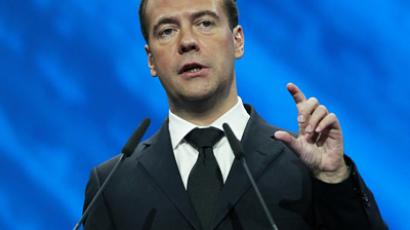Syria sanctions strategy ‘unreliable’ – Lavrov
Russia cannot support the project on Syria being pushed through by the West, Foreign Minister Lavrov stated in New York ahead of his address to the UN General Assembly.
Sergey Lavrov said he believed that placing sanctions on Syria are “not a very reliable strategy”. “We ask what the next strategy is, how have you calculated your next steps? The answer we get is that we haven't thought about it yet, but President Assad needs to go, we need to drive him into a corner with sanctions – he should go first, and then we'll see,” Lavrov said in an interview with “Russia 24” channel. “It's a very simple but – I believe – not very reliable strategy, if it can be called a strategy at all,” he concluded.The United States and the European Union have already implemented unilateral sanctions against Syria.On September 13 they announced measures including bans on oil imports and an asset freeze. Western powers have been calling within the United Nations Security council for a resolution on Syria in the form of a set of sanctions. The US is calling for the resignation of the Syrian president, Bashar Assad, whose regime has led a deadly crackdown on anti-government protesters. And while new fighting erupted in Syria between pro-government forces and rebels for the control of several key cities, Syrian Foreign Minister Walid Moualem said in an address to the UN General Assembly that the West was trying to create “total chaos” in order to break up the country.Government troops have reportedly stormed a key opposition town after pounding it overnight with heavy machine-gun fire.The United Nations says more than 2,700 Syrians, including 100 children, have been killed during six-months of unrest sparked by an uprising against the 41-year rule of the Assad dynasty.
Journalist and anti-war activist Susan Lindauer says that Syria should heed the words of Russia’s foreign minister and allow in foreign mediation. “There is no way the Syrian president can do it by himself, and he is not receiving any proper assistance from the United States or any European power that would be able to offer conflict resolution,” she told RT. “Sanctions are not the answer, sanctions only hurt the Syrian people. If Bashar al-Assad is wise, he would quickly invite a Russian delegation to come in and help the Syrian government resolve this problem.” “Sanctions freeze the situation, so that diplomacy is stalled,” she concluded. “It never works. It is a bad strategy, and it means that they lack ideas for solving the problem.”
‘US does not mind dictatorship’ – US analyst
Jacob Hornberger, founder and president of the Washington-based Future of Freedom Foundation, says the US is pursuing it own goals in Syria. “They are trying to bring in a US-approved ruler, he could be a dictator,” he told RT. “Let’s keep in mind that the US does not have anything in principle against dictatorships. They partnered with the Assad dictatorship to torture men, they supported Mubarak, they supported dictatorships in Saudi Arabia, Jordan. But what they are trying to achieve is to put their man in power – that’s the whole question of US foreign policy. Can they achieve that? It remains to be seen, but there’s always a high cost to this type of imperialistic foreign policy.” “Sanctions, however, have never succeeded in achieving regime change – which is what the US goal is,” he added.














